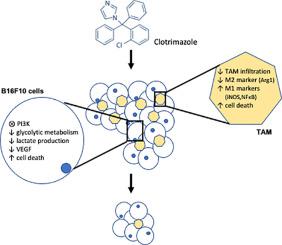Biochimica et Biophysica Acta (BBA) - Molecular Basis of Disease ( IF 4.2 ) Pub Date : 2021-09-02 , DOI: 10.1016/j.bbadis.2021.166263 Alan C Ochioni 1 , Ricardo Imbroisi Filho 1 , Amanda M Esteves 1 , João G B Leandro 2 , Thainá M Demaria 2 , José Xavier do Nascimento Júnior 1 , Filipe S Pereira-Dutra 3 , Patricia T Bozza 3 , Mauro Sola-Penna 2 , Patricia Zancan 1

|
The immune system is a key component of tumorigenesis, with the latter promoting the development of cancer, its progression and metastasis. In fact, abundant infiltration of tumor-associated macrophages (TAM), which are M2-like macrophages, has been associated with a poor outcome in most types of cancers. Here, we show that lactate produced by murine melanoma B16F10 cells induces an M2-like profile in cultured macrophages. Further, we demonstrate that clotrimazole (CTZ), an off-target anti-tumor drug, abolishes lactate effects on the activation of macrophages and induces the expression of M1-like markers. We show that clotrimazole has cytotoxic effects on tumor cells by negatively modulating PI3K, which inhibits glycolytic metabolism and leads to a diminishing lactate production by these cells. These effects are more pronounced in cancer cells exposed to conditioned media of M2-polarized macrophages. Moreover, clotrimazole inhibits tumor growth in a murine model of implanted melanoma, reduces lactate content in a tumor microenvironment and decreases vascular endothelial growth factor expression. Finally, clotrimazole drastically diminishes TAM infiltration in the tumors, thereby inducing M1 polarization. Collectively, these findings identify a new antitumor mechanism of clotrimazole by modulating the tumor microenvironment (TME), particularly the activation and viability of TAM.
中文翻译:

克霉唑对作为 PI3K 抑制剂并诱导肿瘤相关巨噬细胞复极化的小鼠黑色素瘤模型具有抗癌特性
免疫系统是肿瘤发生的关键组成部分,后者促进癌症的发展、进展和转移。事实上,肿瘤相关巨噬细胞 (TAM) 的大量浸润,即 M2 样巨噬细胞,与大多数类型癌症的不良预后有关。在这里,我们展示了鼠黑色素瘤 B16F10 细胞产生的乳酸在培养的巨噬细胞中诱导 M2 样特征。此外,我们证明克霉唑 (CTZ) 是一种脱靶抗肿瘤药物,可消除乳酸对巨噬细胞活化的影响并诱导 M1 样标志物的表达。我们表明克霉唑通过负调节 PI3K 对肿瘤细胞具有细胞毒性作用,PI3K 抑制糖酵解代谢并导致这些细胞产生的乳酸减少。这些效应在暴露于 M2 极化巨噬细胞条件培养基的癌细胞中更为明显。此外,克霉唑抑制植入黑色素瘤小鼠模型中的肿瘤生长,降低肿瘤微环境中的乳酸含量并降低血管内皮生长因子的表达。最后,克霉唑显着减少肿瘤中的 TAM 浸润,从而诱导 M1 极化。总的来说,这些发现通过调节肿瘤微环境 (TME),特别是 TAM 的激活和活力,确定了克霉唑的新抗肿瘤机制。克霉唑显着减少肿瘤中的 TAM 浸润,从而诱导 M1 极化。总的来说,这些发现通过调节肿瘤微环境 (TME),特别是 TAM 的激活和活力,确定了克霉唑的新抗肿瘤机制。克霉唑显着减少肿瘤中的 TAM 浸润,从而诱导 M1 极化。总的来说,这些发现通过调节肿瘤微环境 (TME),特别是 TAM 的激活和活力,确定了克霉唑的新抗肿瘤机制。









































 京公网安备 11010802027423号
京公网安备 11010802027423号